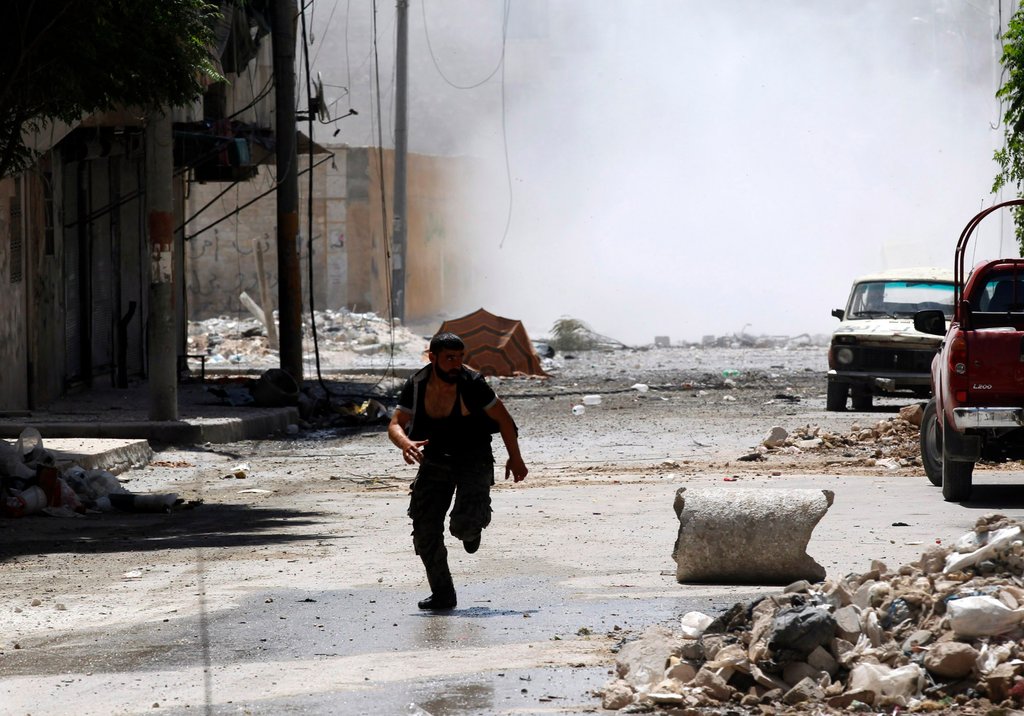The interrupted bombing of the Syrian regime forces in South Syria hasn’t changed the temporary calm status that dominates the region from around one year; power balance between the two parties has almost been absent amid foreign efforts, which have waited changes in the U.S. administration’s foreign policy after the election of Donald Trump.
However, the bet on the western position hasn’t been the only factor to paralyze the “MOC room” (Military Operation Center), known as one of the major supporters of the Syrian opposition factions in the Southern region; agreements between Russia and Jordan, and Russia and Israel to maintain the peace of the region have contributed in preventing both the Syrian regime and the opposition from launching expanded military operations in the southern region.
The map of powers in the Southern side of Syria hasn’t witnessed any strategic change from around 10 months; Assad forces have maintained their control over Daraa, the region’s biggest cities, after it lost control over more than 70% of its surrounding country sides since 2011.
The regime has widened its attacks over the opposition’s operations in Daraa, which may threat the regime’s powers in Damascus – particularly that the city represents the biggest popular threat as it was the first city rebelling against the regime in 2011.
Supported by the MOC room in Jordan, the opposition has gradually succeeded in controlling more than 70% of the Daraa’s surface and reached Quneitra, which caused a major threat for the regime and pushed it to launch a battle in the beginnings of 2015 to prevent communication among the different factions of the opposition.
In fact, calm has dominated the southern region one month after the Russian intervention in Syria on September 30 2015, backing the regime forces, which have recaptured some areas to expand their safe zone.
According to opposition sources, the battles of the southern front have not been supported by the international powers; however, these power’ support will definitely change the strategic power map and widen the opposition’s control.
Jordan and the front’s factions
Over five years, Jordan has maintained good relations with the southern front’s opposition factions, which belong to the Free Syria Army and benefit from close relations with Amman; these factions received Jordan’s support through the MOC room to fight ISIS’s militants in the region. However, the Jordanian-Russian agreements led to exclude the southern front from the Russian operations.
MOC’s persistence
The military action in the southern front is currently pending and the regime and Russians have taken advantage of the fogginess of the U.S. position to achieve victories in the field, according to the Jordanian strategic expert Mohammad Abu Rumman.
Abu Rumman added that the MOC training program has covered the fighting of ISIS not the Russians, and that the statements of international powers now focus on eradicating ISIS and not overthrowing Bashar Al-Assad.
The expert continued that Jordan doesn’t expect any Russian action in the southern region; it has bet on its agreements with Moscow and on the Israeli factor as Tel Aviv will never accept a role for Iran or Hezbollah in the regions near Golan.
Israeli considerations
On another hand, the Israeli party has also imposed a Status Quo in the southern region. According to Marion Abu Zeid, expert in international crises, all the parties have sought to maintain the ongoing Status Quo except for the Syrian regime, which has sought to mark its presence in the field – particularly near Golan borders aiming at using its results later in its negotiations with the international community.
Abu Zeid says that Israel has also concerns on its national security, which urges it to maintain calm in the southern front representing a major threat for the Israeli security; the expert expected Israel to focus on bombing the regime’s forces trying to avoid possible changes in the region’s balances in any probable clashes between the regime and the Tel Aviv-backed faction.
While the opposition tried to breach the ongoing calm in the southern region, the regime has insisted on avoiding tension with Jordan, which will back the opposition factions in any possible battle; this time, Amman will waive its “audience” role and will intervene to avoid three major concerns: the influx of thousands refugees, the growth of ISIS amid the rebels after the regime’s victories, and to protect its borders from clashes that will move from Daraa to the Jordanian borders.
